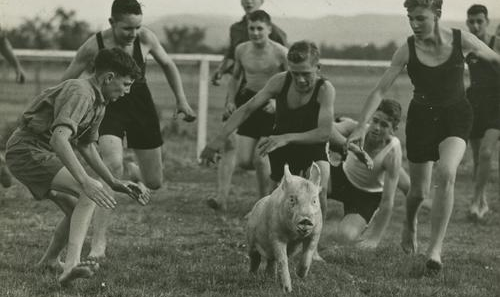As a Chicago sociologist Sudhir Venkatesh had internalized the idea that the Chicago style of urban living was universal, that everybody stayed in their neighborhoods segregated by race and class and that their children lived the same way passing down these patterns generation after generation. Studying New York City from the perspective of coming from Chicago, would you still find a global city when you look at the alleyways? As a sociologist how do you make sense of a city where people move and cross boundaries of neighborhoods? The video shows the „Global Voices Author Lecture“ with Sudhir Venkatesh on his book „Floating City: A Rogue Sociologist Lost and Found in New York’s Underground Economy “, on November 13, 2013, University of Chicago Assembly Hall, closing his talk with a message for everybody who is curious to know what sociology is about: It is about „finding a pig that speaks“.
www.youtube.com/watch?v=_ZPhc0ZzXPU
Sudhir Venkatesh (slightly revised quotes): „Perhaps I just say something about „generalizability“ and that is a good way to close this session. I study small numbers of people. The challenge of the question of generalizability is that people can easily ask who cares about small numbers. Here is my answer.
My uncle studied people who lost their limb, a leg or an arm. And these people still feel that they have his arm or leg what we call phantom limb syndrom. I wanna draw on his study. When he was asked why people should care about small numbers of people his answer was: Imagine that I had on my hand a leash, and on my leash I had a pig, and that pig I put on this podium spoke fluent English. It recited a lovely shakespearian sonate to you…What would your question be for me? Would you say: „Can you go out and find two pigs like that before you tell us how that pig spoke English?“
You see how ridiculous that is?! Instead, you wanna know how this pig could speak English. And this is why I study pigs that speak and try to figure out how to make sense of pigs that speak. And that is a particular kind of quest: Go into the world and find something really interesting and how to make sense of it and figure out if and whether it has some applicability. Most of the time, though, is to try to find out HOW this pig speaks. – With that I have to close and I hope you all find your pigs that speak.“
Sudhir Venkatesh is Williams B. Ransford Professor of Sociology at Columbia University and a UChicago alumnus (PhD ’97). His book, Gang Leader for a Day, received a Best Book award from The Economist and his previous works have received accolades from Slate.com and Publishers Weekly. A contributor to The New York Times, the Chicago Tribune, the Washington Post, and a frequent guest on NPR, Venkatesh is de facto public intellectual. Venkatesh joined the International House of the University of Chicago on November 13, 2013 to discuss his latest book, Floating City: A Rogue Sociologist Lost and Found in New York’s Underground Economy. In this book, he returns to the streets to connect the dots of New York’s divergent economic worlds and crack the code of the city’s underground economy. Based on interviews with prostitutes and socialites, immigrants and academics, high end drug bosses and street-level dealers, Floating City exposes the underground as the city’s true engine of social transformation and economic prosperity — revealing a wholly unprecedented vision of New York.
A memoir of sociological investigation, Floating City draws from Venkatesh’s decade of research within the affluent communities of Upper East Side socialites and Midtown businessmen, the drug gangs of Harlem and the sex workers of Brooklyn, the artists of Tribeca and the escort services of Hell’s Kitchen. Venkatesh arrived in the city after his groundbreaking research in Chicago, where crime remained stubbornly local: gangs stuck to their housing projects and criminals stayed on their corners. But in Floating City, Venkatesh discovers that New York’s underground economy unites instead of divides inhabitants: a vast network of “off the books” transactions linking the high and low worlds of the city. Venkatesh shows how dealing in drugs and sex and undocumented labor bridges the conventional divides between rich and poor, unmasking a city knit together by the invisible threads of the underground economy.
Bild: State Library of Queensland’s collection (chasing a pig)
References
Eisenhardt, K. M. 1989. „Building Theories from Case Study Research.“ Academy of Management Review 14(4): 532–50.
Ramachandran, V. 1998. „The perception of phantom limbs. The D. O. Hebb lecture“. Brain 121(9): 1603–30.
Siggelkow, N. 2007. „Persuasion With Case Studies“. Academy of Management Journal 50(1): 20–24.
Yin, R. K. 2003. Case Study Research: Design and Methods (3. ed.). Thousand Oaks et al.: Sage.


Schreibe einen Kommentar